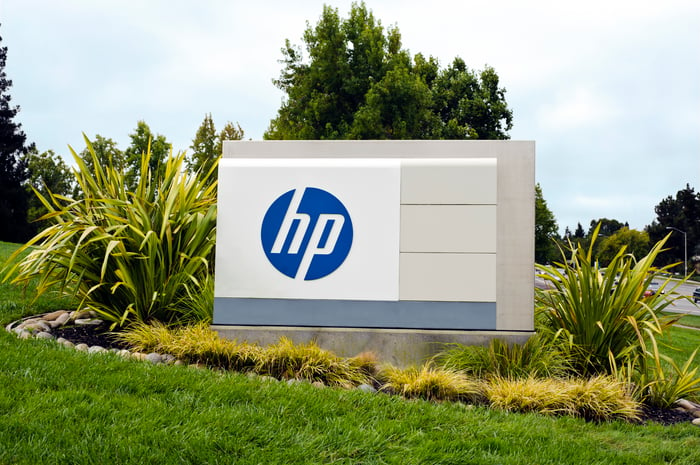HP's (HPQ 0.11%) stock has declined nearly 10% over the past three years as the S&P 500 has rallied nearly 40%. Even after factoring in reinvested dividends, it generated a total return of less than 1%.
HP struggled as its relatively stable PC sales were offset by declining sales of printers and printing supplies. The resignation of CEO Dion Weisler, a failed hostile takeover bid by Xerox (XRX), and COVID-19 disruptions also kept the bulls away.

Image source: HP.
However, worldwide PC shipments grew 13% year-over-year in the third quarter of 2020, according to Canalys, marking the industry's strongest growth in a decade as the pandemic lifted sales of PCs for remote work, online education, and video games. Will those tailwinds stabilize HP's business and make it a compelling investment again?
Reviewing HP's issues
Last quarter HP generated 72% of its revenue from its Personal Systems business, which sells notebooks, desktops, and workstations. The unit's revenue grew 7% year-over-year as the pandemic sparked more PC purchases.
However, HP relied on a 32% jump in notebook shipments to offset a 30% drop in desktop shipments during the quarter, and that feverish demand for notebooks could quickly cool off after the pandemic ends. Fierce competition from rivals like Lenovo and Dell will also throttle HP's ability to raise prices.
The remaining 28% of HP's revenue came from its Printing business last quarter. The segment's revenue plunged 20% year-over-year as the single digit growth of its consumer hardware business (buoyed by work-at-home trends) was wiped out by its double-digit revenue declines in commercial hardware and supplies.
HP's printing hardware and supply businesses are both stuck in secular declines: Demand for printers is waning as digital documents replace printed ones, and online sales of cheap generic ink and toner are eliminating the need for HP's branded products. The ongoing decline of HP's printing supply business is particularly worrisome, since it generates much higher margins than its hardware business.
The weakness of HP's printing business once again offset the growth of its PC business, and its total revenue fell 2% year-over-year for the quarter. Operating margins at both segments contracted, and its adjusted EPS tumbled 16%. Analysts expect its revenue and earnings to decline 5% and 2%, respectively, for the full year.
Treading water... but slowly sinking
HP desperately needs to patch up its sinking printing business, but its strategies haven't borne fruit yet.

Image source: Getty Images.
Under Dion Weisler, HP expanded the division by buying Samsung's printing business and Apogee, Europe's largest independent provider of managed print services. It also started selling more industrial 3D printers. That increased scale boosted the segment's revenue inorganically, but its growth quickly faded after it lapped those big acquisitions.
To counter generic ink vendors, HP launched a subscription service called Instant Ink, which delivered new cartridges to customers before the existing ones ran dry. The plans were priced based on the number of pages printed each month, but customers who only occasionally printed documents probably didn't see a pressing need to subscribe.
Instead of offering aggressive turnaround strategies, CEO Enrique Lores, who succeeded Weisler last November, is mainly focused on cutting costs, buying back shares, and paying out dividends.
HP expects its free cash flow to decline from $4.0 billion in 2019 to $2.5 billion to $3.0 billion this year, but Lores still told investors the company would return "100%" of its FCF to investors "over the long term, unless higher return on investment opportunities emerge" during last quarter's conference call.
Don't buy HP unless it makes some tough decisions
I think three things could happen to HP. First, it could maintain the status quo, tread water with buybacks, and eventually be pulled under by its dying printing business. Second, it could reconsider a merger with Xerox, which would unite one the world's top printer makers with one of its largest photocopier makers.
Lastly, it could consider spinning off its printing business into a separate company. Doing so would allow HP's PC business to compete more effectively against Lenovo and Dell, which don't sell printers, while allowing the stand-alone printing business to either restructure itself or merge with another company.
I would only consider buying HP if it considers a sale or a spin-off. The stock might seem like a bargain at eight times forward earnings with a forward yield of 3.6%, but it's cheap because it's in serious trouble.





